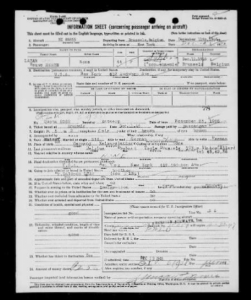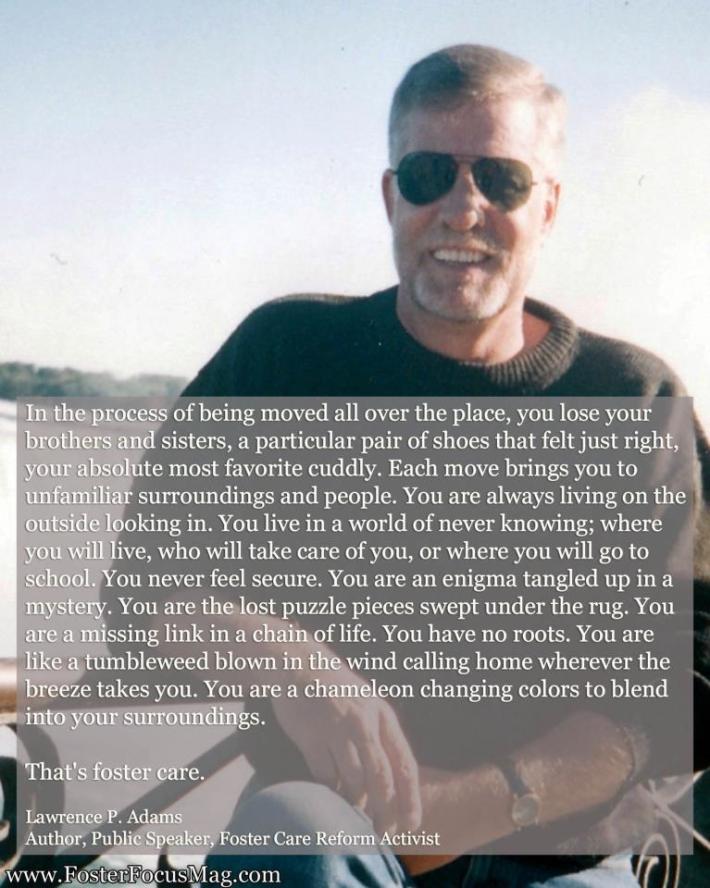I have been posting on Facebook for the past month that an article I wrote of my years at Boys Town would be appearing in the June 2013 edition of Foster Focus Magazine and promised to share it on Facebook.
Unfortunately for some reason I am unable to post the actual article from the Foster Focus June 2013 edition on Facebook. It appears to be too large due to the photographs chosen to be used in the article. I am including the text of the article in this WordPress blog as many on Facebook have requested being able to read the article.
It is my hope that the “older generation” of Boys Town will relive a bit of our past when reading the article’ the newer generation will learn how things were in the past and others will learn a bit about Boys Town and the impact it had not only on my life but to the thousands who have walked this campus.
Here is the article in its’ entirety but unfortunately without the photos used in the magazine:
By Larry Adams
Foster Focus Contributor
I have been asked if I could write an article describing daily life at Father Flanagan’s Boys Home; famously known simply as “Boys Town” located in Omaha, Nebraska.
It is difficult to fulfill this request as no two days at Boys Town can be described as typical. Yes, there were certain daily functions like meal time and school, much more was offered each day to fill a boy’s time.
Rather than a typical day I would rather write in generalities of my seven plus years at Boys Town as well as what it has meant to me to this very day.
I entered the foster care system in Michigan on the day of my birth. Before Boys Town I had been moved thirteen different times between institutions and foster homes. I arrived at Boys Town, Nebraska in the late morning of April 16, 1961.
I arrived a terrified, anger filled boy of 11. I had “my brown paper bag” of worldly possessions with me. I had no idea what was to become of me. I was in a place I had never heard of before arriving.
After a brief meeting with a caseworker, my social worker departed Boys Town for her return flight to Detroit. I felt I was alone and lost in the world.
I was taken to what they, at that time, called the Orientation Center. There, I was shown a bed and a locker that was to be mine supposedly for the next 2-3 weeks. Then I was tested, interviewed and they determined to what part of Boys Town I would be sent.
I still very clearly remember crying myself to sleep my first night at Boys Town and for nights afterwards.
I still remember after being at Boys Town about a week, a counselor coming to visit with me. While talking with me he decided to checkout my locker. There he found “my bag.” I should say that in the first days there one was taken to the clothing store on campus and given a number of sets of clothes and toiletries. Mine were all packed in “my bag.”
The counselor asked me “Why were all your things in a bag rather than hanging up or on the shelves?”
I told him “I wanted to be ready when they came to get me again to take me elsewhere.”
The counselor called me over to and took me in his arms saying, “No one is going to come and take you away. I know about your life to this point and I want to let you know….you now have a home.”
I don’t think he ever fully figured out the emotions he triggered within me with those words. My eyes began misting up and before long I was crying uncontrollably. “You now have a home” kept going through my mind. “No one is going to come and take you away.” For the first time in my life someone had actually said “I was home.” I had waited over 11 years to hear those words. I don’t know how long the counselor held me in his arms, but I know it was long enough for us to miss dinner in the dining hall and he had to make arrangements for food to be brought to me. I know that for the first night since coming to Boys Town I did not need to cry myself to sleep.
Soon after leaving orientation for Gregory Hall, I was caught up in the activities at Boys Town as most boys were. Though the school year would soon be over, I was assigned to the 5th grade. I began daily choir practices along with the other choir members. Now that I had a home, my life looked different. I even unpacked “my bag” for the first time in almost 11 years…it was never packed again.
The remainders of my middle school years were rather uneventful. I continued to pass to my next grade. I was singing in the Chancel Choir and later the Repertoire Choir. During those years, I did not consider myself very athletic, so I left sports alone. I was awaiting graduation from eighth grade when I would be able to transfer to the high school section and a new world of privileges would await me.
Though Boys Town was considered a village unto itself, it was very much a part of the Omaha community. Because I was active in choir and other music programs, I had many opportunities to travel into Omaha with escort, to attend a wide variety of functions. These events could include chamber music concerts, chorale concerts or even us boys giving concerts.
Boys Town also had a wide-ranging athletic program and back in the 1960s we were amongst the top teams in the state. Boys Town won several state titles in basketball and football. When the teams were not playing at home, we boys went to town with them to cheer them on. Thus, many opportunities presented themselves for us to meet people of the community and even develop friendships. Most of my friendships came while I was in high school, but I loved the chance to go to Omaha for events while still in grade school.
June 1964…Graduation Day…I am now a high schooler. Graduation Day is the day any boy who had spent some years at Boys Town awaited. I had already been here over three years. I would move from a dorm of 25 boys to a cottage which had 5 bedrooms with only 4 boys per bedroom. Privileges not allowed grade schoolers were now mine; I could obtain passes to downtown Omaha; I could get a one week vacation away from the home if I had somewhere to go and it was approved; I could start to smoke. Yes, Boys Town allowed high schoolers to smoke back then. Now smoking is not permitted by anyone on campus.
Graduation was another one of those sad days for me. Many of the boys in my class of 1964 had family come to cheer their graduation. I had no one present.
Each high school boy was to have a job on campus. This is how we were to earn our thirty dollars a month we were given.
I had a great job my freshman and sophomore year. Msgr. Wegner, late former Executive Director of Boys Town, had his home connected to the chapel. My job was to be up at 5:30 and to be at his home by 6:15. I was met by Mrs. Ann Fischer, his personal cook. Mrs. Fischer was the mother of the famous Fischer boys of the National Football League. It was my job to help prepare breakfast and serve for him. It was great working with Mrs. Fischer. She always saw that I had a snack to take to school when I left for class. She said a growing boy needed more than three meals a day.
It was during those two years that Msgr. Wegner took me under his wing and we got to be fairly close. Though the adults were not suppose to give us money Msgr. always saw that I had a few dollars in my pocket. Once breakfast was served he usually invited me to join him at the table. We always had interesting conversations.
Msgr. Wegner’s and my relationship continued throughout my remaining years at Boys Town. His door was open to me whenever I wanted to visit with him if he was in town.
During my senior year while I was still entertaining the thought of becoming a priest he arranged for me to spend a week at Mount Michael Abbey in Elkorn, Nebraska. It was shortly after that week I decided it was more my desire to be like Msgr. Wegner than a real vocation making me think of becoming a priest. I decided not to enter the seminary. I believe Msgr. Wegner knew this would be my decision but he allowed me to make it on my own rather than directing me in any one direction.
He provided me with a “father” figure, missing from the early days of my childhood. He went further out of his way to support me than his position required.
I felt a little athletic my freshman year and went out for wrestling and track. My wrestling career didn’t last long, as after my first two defeats, the coach decided it was not my sport and suggested I concentrate on track. I ran hurdles and one mile. I was not spectacular at either, but survived the season.
I have to be honest and say I did not set the world of schooling on fire during my freshman and sophomore years of high school. In matter of fact,, I had no real interest in school and did only what was required to skate through. By the end of my sophomore year I ranked near the bottom of my class. It was not due to lack of intelligence rather; “I just didn’t care” as I was still mad at the world.
My junior year brought a sudden transformation of my life that I am grateful for to this very day. I, even as a small child, loved to argue. If it were night I would argue it was day, anything for an argument. My English teacher that year was a Ms. Genevieve Condon.
Yes, I even argued in her class! She saw something positive in my argumentative nature. Ms. Condon kept me after school one day early in the school year. She talked to me about my arguing and how she saw it as an ability, if it were directed in the proper way. I had no idea what she was talking about.
Ms. Condon took me to meet Mr. Clarence Weinerth; another English teacher but also the coach for the newly begun Speech & Debate Team. Ms. Condon simply told him, “I think we have a debater for you.” Yeah, I could now argue, and get away with it! Mr. Weinerth of course let me know that with the ability to argue I also now had to prove my case. This meant lots of hard work researching the question being debated. It also meant that to be part of the debate team and go to tournaments, my grades had to improve. I was determined to do whatever it took.
I made the novice debate team that year. I was a good debater, even though rough around the edges. My senior year, I made the varsity debate team. My partner (Jim Acklin) and I were, if I say so myself, great. Jim and I were rarely defeated. We traveled throughout the Midwest on weekends during the season, accumulating numerous trophies as winners of the tournaments. Our record at the end of the season was 289 wins as opposed to only 29 defeats. I still wonder how we lost the 29!
In January of 1968, I decided to enter the political arena and run for Mayor of Boys Town. Boys Town is a separate village. When Fr. Flanagan began the home, he determined it should be self-governed by the boys themselves, of course with his guidance. A new mayor and city council would be elected every six months. I felt I had something to offer Boys Town and tossed my hat in the ring.
My first venture into politics turned into a solid defeat, coming in next to last. It was not to be my last political venture.
In February of 1968, I turned eighteen and technically “aged out of the system.” It was also my senior year in high school. Though I could have walked out of Boys Town; I didn’t! I wanted to earn my diploma! It was also proving to be the first time in my life that I was accomplishing something and I wanted to see it to the end. I think in many ways it was the year I grew up!
A lot of things are packed into the last few months of one’s senior year of high school. Boys Town was no different. In February I was shocked to learn that my girlfriend (Marilyn) and I were chosen as King and Queen of the Sweetheart Ball for Valentine’s Day. Marilyn was a debater at another local high school. We had met at a tournament and started dating late in my junior year. I spent most of my passes into town my senior year, when I wasn’t away at a debate tournament with Marilyn.
In April was an Awards Banquet for varsity athletes to receive their BT letters and jackets; debate was considered a sport at Boys Town and I wore my jacket proudly. In May it was the Junior/Senior Prom at Peony Park Pavilion in Omaha. I wore a tuxedo for the very first time and of course took Marilyn as my date. Graduation being but a few weeks away, we were allowed to stay off campus well into the night. Preparations also had to be made as to what I would do after graduation.
Two years before I was near the bottom of my class of one hundred-thirty eight. Now I was in the top 5%. Ms Condon and Mr. Weinerth had accomplished their mission. They took a poor student who loved to argue and made a winning debater/orator out of him while also for the first time giving him a genuine interest in school. I will forever be grateful to them both. Ms. Condon is long deceased. I had visited Mr. Weinerth in my few return visits to Boys Town. He passed away at 95 in June 1999. Though in his later years he was physically incapacitated, his mind remained as sharp as a knife. On my last visit he had me take a scrapbook from his night stand to look at; one of the few mementos he took to the home with him. Inside were all the pictures taken and articles written of Jim and I. His words; “I have always been proud of my boys.” My debate partner Jim and me remained close friends after leaving Boys Town until his death in a plane crash, he was testing a new fighter plane in the US Air Force, in 1987.
June 2, 1968, Graduation Day arrives. The day I had been awaiting for seven years, one month and seventeen days.
Graduation at Boys Town is different from any other high school graduation in the country. You are not only graduating high school; you are also loosing “your home.” Boys Town had for over seven years provided me “a home.” It had provided me nurturing, a spiritual compass, an education. Graduation meant you are now an adult and it is time for you to go out in the world and make whatever mark on it you are capable of. It meant that for the first time in over seven years I would once again be “homeless.” The graduation ceremony begins mid afternoon on a Sunday and the rule is that ALL graduates must be off campus by 5 p.m. It was time to make room for new boys.
A day like graduation should be a joyous occasion as you have accomplished the first major step in your life. However, it was not such for me. I had made many friends in the Omaha and surrounding communities over the years due to debate, and many of them accepted my invitation to graduation. They cheered and stomped when my name was called. I still felt emptiness. Yes, I had friends present, but no family who would hug, congratulate and say how proud of me they were.
The fullness of graduation hit me after the ceremony when I walked to the high school building for the final time as a boy of Boys Town. After turning in my cap and gown I went to the table where I would collect a one way bus ticket to wherever I wanted to go, $50.00 from Boys Town and whatever money I had saved during my years there….which came to about $700. Fortunately I had been a saver at Boys Town; a trait I still possess today. With a final good-bye and a wish of good luck it was time to go; time to “leave home.” The only good thing was that this time I was not leaving home with only “a brown paper bag.” I was leaving with suitcases of clothes, boxes of books and mementos collected over seven years.
I remember standing outside the high school building and wondering “Am I ready?” “What am I going to do?” “Where is home?” and I made sure no one could see..a mist blurring my vision.
I should note that on the Friday before graduation I learned I had two full scholarship offers to continue my education. I accepted the offer from Midland Lutheran College in Fremont, NE.
Ready or not it was time to leave from the safe, stable confines of Boys Town which I had known as “home” into the world of the unknown.
I arrived at Boys Town with a half filled brown paper bag and left with suitcases of clothes, boxes of books and mementos. I arrived at Boys Town hating school and left graduating in the top 5% of my class and a full scholarship to college. I arrived with many bad memories of years in foster care and left with memories of “short sheeting” the tough guys, fishing at the BT lake and eating freshly fried fish behind the dining hall, having freshly baked Danish with melted butter from the bakery, running across to the 10 Mile Inn to see if they would serve us, the 1st cigarette or choir section adventures. The “Twelve Night” celebrations, “intramural sports”, The “Boys Town Choir,” once nationally known from its’ tours and records, “Christmas Eve Midnight Mass”, even the two week Liturgical Music Workshop at Boys Town attracting, renowned musicians and scholars from across the globe, the “Trade School” in which many boys learned a skill that would provide a lifetime career.
Discipline was being part of the “floor shining gang.” Now, bear in mind this was not done with a power shiner. Let me describe this floor buffer for you. It had a metal pole about four feet in length. Attached at the bottom was a 15-20 pound piece of square iron with bristles on the bottom of it. This is what was used to shine the floors. One first went over the floor several times with just the brush touching the floor. Then you repeated the process with a cloth beneath the bristles.
Let me tell you, when one finished you could see your face in the floor. Your arms were also tired as heck. I made this floor shining gang more than one time.
As you can see, we boys of Boys Town were your typical teenage boys. These were some of the things that made all of us at Boys Town part of the community and “our home.”Though I didn’t realize it until years later…these were very good years. Sending me to Boys Town was the best decision made for me during my 18 years of foster care!
Boys Town had been more than just a place that the foster care system had dumped me into. It had raised me, given me an education, nurtured me, given me a spiritual basis for my life and so much more. It had in fact been a “home.”
I have returned to Boys Town for class reunions and will do so again for my 45th is just a few weeks away.. Though the changes have been made and continue, I will make the most of my time there…I will make it “my home” even if it is just for a weekend…it is still the only “home” I have ever known. “Home” was taken from me far too many times in my young life…I won’t allow anyone to take “my home” from me now or ever!
Filed under: Adoptee, Adoption, Birth Parents, Boys Town, Family, Foster Care, Foster Care Reform, Foster Kids, Foster Parents | 8 Comments »






















